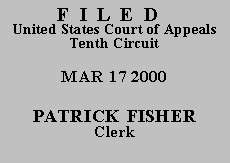

|
UNITED STATES OF AMERICA, |
|
Before BRORBY, KELLY, and MURPHY, Circuit Judges.
Michael D. Smith pleaded guilty to a single count of possessing, on November 2, 1997, cocaine base with intent to distribute in violation of 21 U.S.C. § 841(a)(1). At the time of the guilty plea, all parties contemplated that Smith's eligibility for one of the minimum mandatory sentences set out in 21 U.S.C. § 841(b) would be answered by reference to all relevant conduct, as that term is defined in the United States Sentencing Guidelines ("U.S.S.G."), not just the conduct relating to the offense of conviction. See United States v. Reyes, 40 F.3d 1148, 1150-51 (10th Cir. 1994), overruled by, United States v. Santos, 195 F.3d 549, 552-53 (10th Cir. 1999).
In line with this assumption, the United States Probation Office prepared a Presentence Investigation Report ("PSR") concluding that Smith had possessed with intent to distribute 14.175 grams of cocaine base on November 2nd. The PSR further concluded that the total amount of drugs attributable to Smith under the U.S.S.G. relevant conduct provisions was 77.915 grams of cocaine base. The 77.915 grams of cocaine base attributable to Smith resulted in an offense level of 32. See U.S.S.G. § 2D1.1(c)(4). The PSR adjusted Smith's offense level downward three levels based on Smith's acceptance of responsibility. See U.S.S.G. § 3E1.1(a), (b). Because Smith had a criminal history category of II, his offense level of 29 resulted in a sentencing range of 97 to 121 months. See U.S.S.G. ch. 5, pt. A, sentencing table. Nevertheless, utilizing the relevant conduct quantity of 77.915 grams, rather than the 14.175 grams actually underlying the offense of conviction, the PSR concluded that Smith was subject to a minimum mandatory term of 120 months under 21 U.S.C. § 841(b)(1)(A). Accordingly, the PSR concluded that Smith's real sentencing range was 120 to 121 months imprisonment.
At the sentencing hearing, the district court adopted the PSR and sentenced Smith to a term of imprisonment of 120 months. Smith never objected to the use of relevant conduct drug quantities to establish his minimum mandatory sentence under § 841(b).
On October 4, 1999, Smith's counsel filed a brief in this court pursuant to Anders v. California, 368 U.S. 738 (1967), together with a motion to withdraw as attorney of record. In the brief and motion, counsel noted that Smith had insisted on an appeal, but that counsel's review of the record demonstrated that no non-frivolous issues existed to raise on appeal. Noting that this court's decision in Reyes had recently been overruled, see Santos, 195 F.3d at 552-53,(1) we ordered the parties to file supplemental briefs addressing the propriety of the district court's sentencing calculations.
In its supplemental brief, the United States confesses error and asks this court to remand the case to the district court for resentencing within the sentencing guideline range set out in the PSR and without regard to the § 841(b) minimum mandatory. Although not bound by the government's confession of error,(2) this court agrees that in light of Santos, the district court erred in sentencing Smith pursuant to § 841(b).(3) We further agree that a remand for the specific purpose of allowing the district court to exercise its discretion to sentence Smith within the 97 to 121 month range set forth in the PSR is the appropriate remedy.(4) Accordingly, exercising jurisdiction pursuant to 28 U.S.C. § 1291 and 18 U.S.C. § 3742, this court REMANDS to the district court to vacate Smith's sentence and resentence him consistent with this opinion.
ENTERED FOR THE COURT:
Michael R. Murphy
Circuit Judge
*. This order and judgment is not binding precedent, except under the doctrines of law of the case, res judicata and collateral estoppel. The court generally disfavors the citation of orders and judgments; nevertheless, an order and judgment may be cited under the terms and conditions of 10th Cir. R. 36.3.
1.In Santos, this court adopted the uniform approach of other circuits and held that mandatory sentencing directives in § 841(b) are governed solely by the drug quantities involved in the offense of conviction for which sentence is imposed, without considering U.S.S.G. relevant conduct.
2.See United States v. Osuna, 189 F.2d 1289, 1295 n.7 (10th Cir. 1999).
3.On appeal, the government simply confesses error. It does not argue that the district court's sentencing error was not "plain" and therefore not remediable under Federal Rule of Criminal Procedure 52. Because the government has neither raised nor briefed the issue, this court offers no opinion on that question.
4.Such a remand is appropriate unless the district court makes clear during the sentencing proceeding that the sentence would be the same with or without the minimum mandatory. See United States v. Urbanek, 930 F.2d 1512, 1516 (10th Cir. 1991).